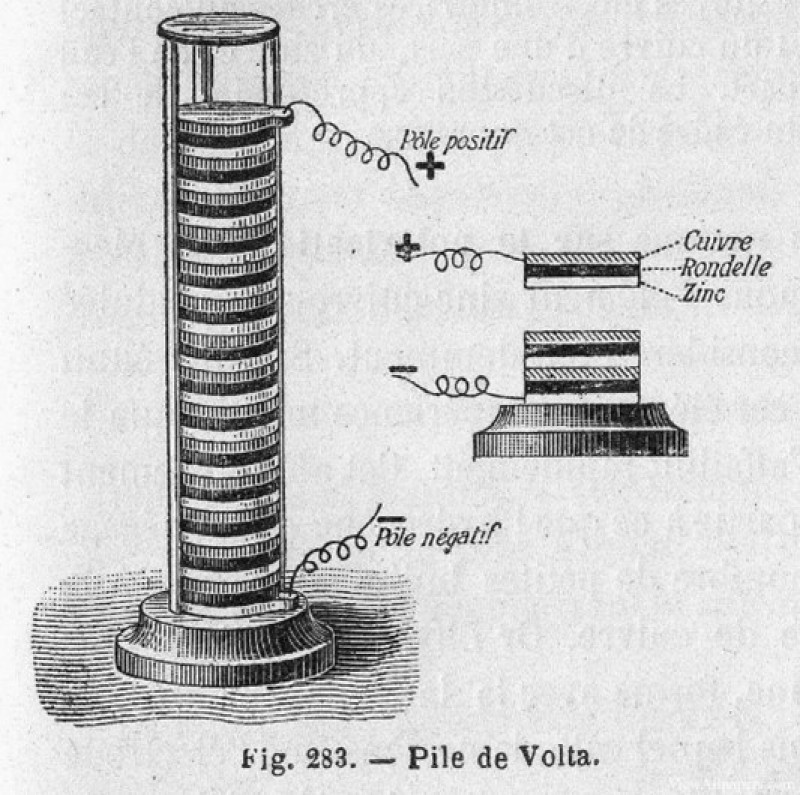News
Celebrating the Birth of the Battery
Every year on February 18th, we celebrate International Battery Day. This day is marked to honor Alessandro Volta’s birthday, the Italian physicist known for inventing the first real battery in 1801. This year, International Batteries Day coincides with the new EU Batteries Regulation becoming applicable. On this occasion, we delve into the early history of the battery.
Volta's battery was a simple yet groundbreaking invention. He stacked a series of silver (or copper) and zinc discs, placing them between pieces of leather (or cardboard) soaked in saline to conduct electricity. To test the flow of electricity, he touched the battery with his tongue.[1] Despite the simplicity of the design, it sparked a revolution. His invention, known as the voltaic pile, was the very first device that could provide a steady, lasting current of electricity, leading to substantial advancements in science and technology.
Interestingly, the concept of a battery may have been around already for about 2,000 years before Volta's invention. In 1938, German archeologist Wilhelm König found a clay jar from the Parthian Empire near Baghdad.[2] This jar, filled with a vinegar solution and containing an iron rod surrounded by a copper cylinder, could produce 1.1 to 2.0 volts of electricity. However, whether it was actually used as an energy source is still a topic of debate among scientists. It stays an intriguing mystery.[3]
The term "battery" was actually coined by former U.S. president Benjamin Franklin, who discovered the difference between conductors and insulators of electricity. In 1748 - a few years before Volta's invention - Franklin experimented with charging Leyden jars in series. He developed a system involving 11 panes of glass with thin lead plates glued on each side, which were then connected together. He referred to his electrostatic battery as an "electrical battery" in a 1749 letter discussing his electrical research. It's believed that Franklin's choice of the word “battery” may have been inspired by a humorous play on the military term for weapons functioning together.[4]
Today, batteries have become an integral part of our everyday lives, storing electrical energy for a multitude of applications. Statistics from Bebat reveal that on average, each household in Belgium owns 131 portable batteries, out of which 30 are empty. This underscores the ubiquity of batteries, from their function in small devices like watches and hearing aids to the larger ones in appliances such as wireless drills and vacuum cleaners. Due to their efficiency and versatility, batteries, in all shapes and sizes, play a critical role in the European Union's transition to a climate-neutral economy. They have found their way into numerous sectors, including consumer electronics, communication devices, internal combustion engines, electric vehicles, and energy storage systems. As we move forward, the role of batteries will only continue to expand and evolve, shaping the future of energy consumption and storage.
This International Battery Day, you can join in the celebration by:
Learn about batteries. Understand the different types and appropriate usage of batteries. High school classes can engage in experiments with batteries (Bebat).
Recycle old batteries. According to the new Batteries Regulation, all battery retailers must accept used batteries.
If close by, visit battery-related museums. Consider the Volta Temple and Museum in Como, Italy, see a 19th-century voltaic pile at the Faraday Museum in London, UK, or bring your class to Bebat's Villa Pila in Tienen, Belgium.
On this special day, let's appreciate the significant role that batteries play in our daily lives and the genius of Alessandro Volta for his remarkable invention.
[1] Fabbrizzi, L. (2023). The invention of Volta’s Pile and its diffusion in Europe at war in the year 1800. Pure and Applied Chemistry, 95(11), 1141-1157. https://doi.org/10.1515/pac-2023-0504
[2] Dutta, A., Mitra, S., Basak, M., & Banerjee, T. (2023). A comprehensive review on batteries and supercapacitors: development and challenges since their inception. Energy Storage, 5(1), e339. https://doi.org/10.1002/est2.339
[3] Battery University. (2022, February 22). BU-101: When was the battery invented? https://batteryuniversity.com/article/bu-101-when-was-the-battery-invented
[4] “Electrical battery” of Leyden jars, 1760-1769. “electrical battery” of leyden jars - the Benjamin Franklin Tercentenary. (n.d.). http://www.benfranklin300.org/frankliniana/result.php?id=72&sec=0



